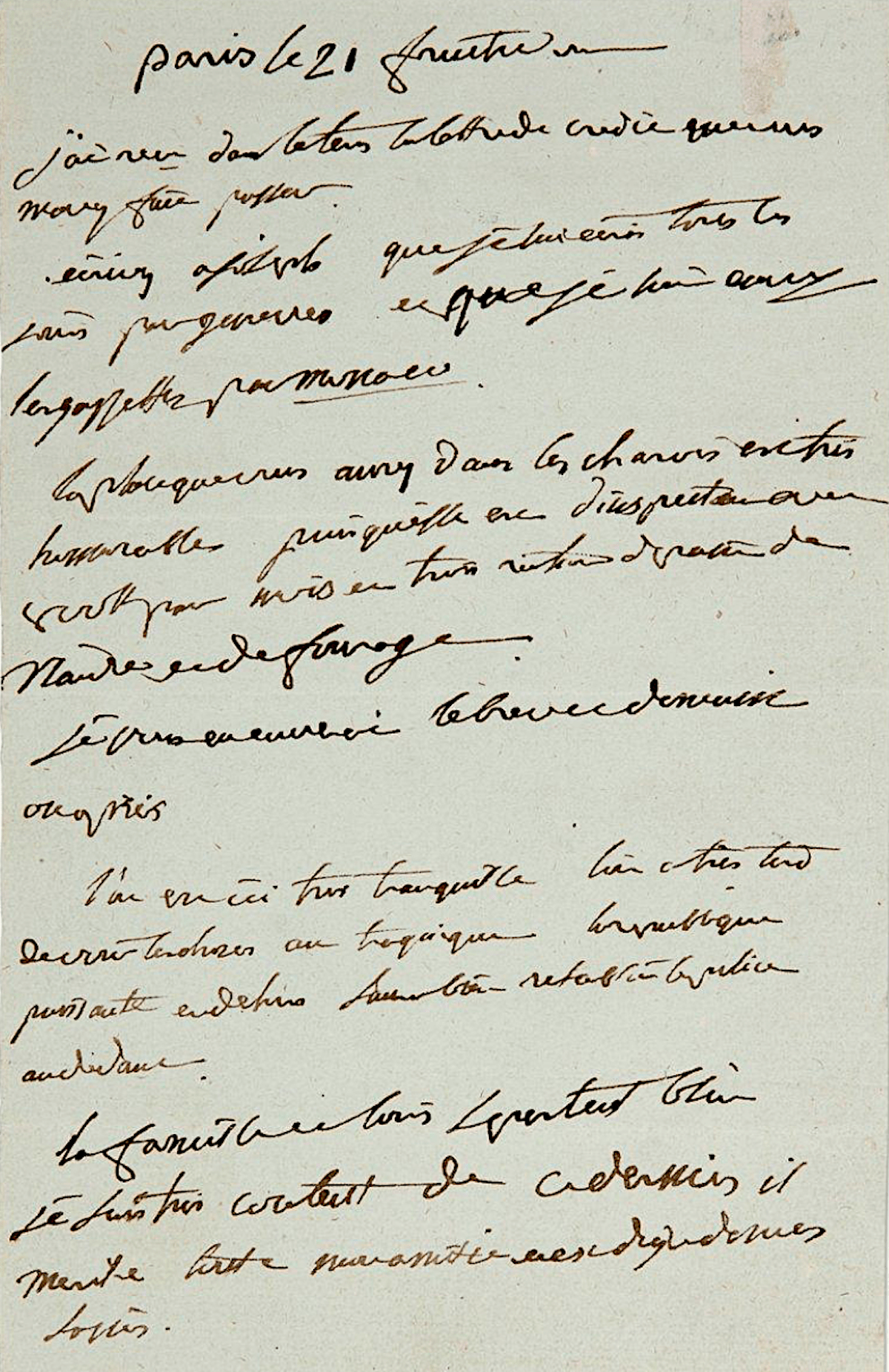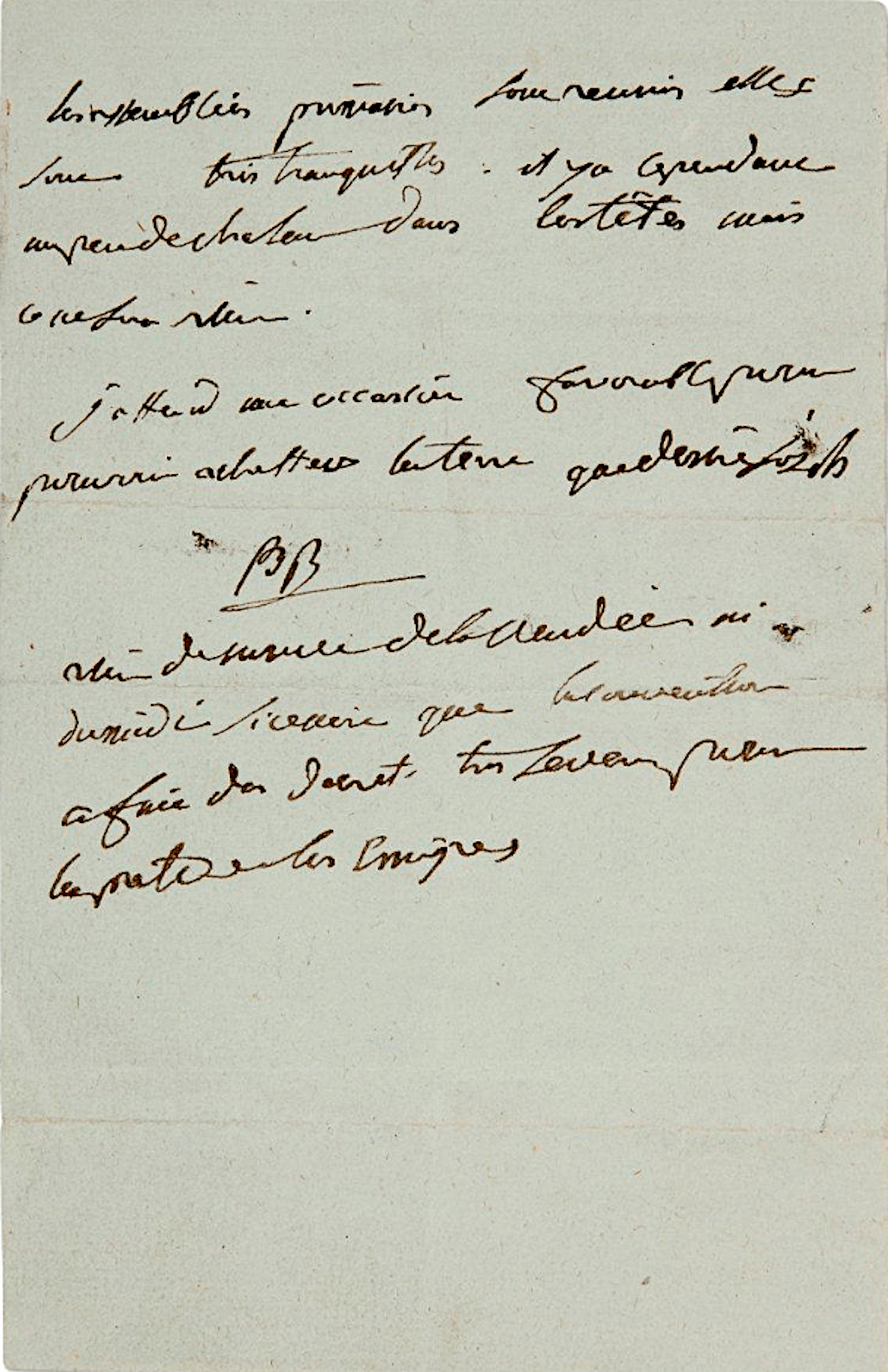NAPOLEON (1769.1821)
Autograph letter signed to André Ramolino, cousin of Letizia Bonaparte.
Two pages in-8°
Paris. 21 Fructidor (September 7, 1795)
Precious and rare letter from the hand of Bonaparte about his brothers Joseph and Louis, as well as on the political situation in France after the adoption by the Convention of the Constitution of Year III.
“I received in time the letter of credit that you sent me. Write to Joseph that I write to him every day through Geneva and that I send him the gazettes through Monaco. The place you will have in the charois is very honorable since it is an inspector with 800ll per month and three rations of meatloaf and fodder. I will send you the patent tomorrow or later. We are very calm here, we are very wrong to see things as tragic; the powerful republic outside will know how to re-establish the police within. The family and Louis are doing well. I am very happy with the latter, he deserves all my friendship and is worthy of my care. The primary assemblies are reunited, they are very quiet. There is, however, a little heat in the heads but it will be nothing. I am waiting for a favorable opportunity to be able to buy the land that Joseph wants. BP. Nothing new from Vendée or the South except that the convention has made very severe decrees for priests and emigrants.
This letter is addressed to the first cousin of the mother of the future emperor: André Ramolino. A Corsican politician born and died in Ajaccio, Ramolino was faithfully protected by Napoleon. As early as 1792, the two men were already doing business, as evidenced by a letter from Cardinal Fesch dated September 10. This loyalty from Napoleon resulted in a final favor: a few hours before leaving his fallen Empire, in June 1815, he made his correspondent the last Count of the Empire.
In this missive, Bonaparte promised Ramolino the certificate of cart inspector. The gift is significant: Under this forgotten name was designated the transport of food, military effects, artillery equipment, and other services which took the form of very lucrative companies. Joseph Bonaparte also held this position. Bonaparte's promise expressed in this letter was respected. Another letter, addressed to his brother Joseph, dated October 9, 1795, is formal: “ Ramolino is appointed cart inspector .”
Written the day after the first republican constitution (Constitution of Year III), these lines are a strong testimony to the Parisian atmosphere in these crucial hours of French History.
Napoleon's character, ambition, his brotherly love, his republican fervor and his lucidity appear in turn when reading this page.
Napoleon, in fact, will never stop providing for the needs of his brothers and raising them with him to the top of the State. This concern for their interests appears very clearly in this letter. And the daily correspondence during this same period with his brother Joseph echoes this. The day before our letter, another addressed to Joseph declaims this same love; “ I am very happy with Louis; he responds to my hope and the expectation that I had of him. It's a good subject; but also it's my way: warmth, spirit, health, talent, exact commerce, kindness, it brings everything together. You know, my friend, I only live by the pleasure I give to my own people. If my hopes are seconded by this happiness which never abandons me in my undertakings, I will be able to make you happy and fulfill your desires .
Above all, his determination and his initial faith in the Republic appear unshakeable. Our letter precedes the bloody repression of the royalist insurrection by barely a few weeks. Bonaparte, in fact, on October 5, having just been appointed general-in-chief of the home army, had the crowd machine-gunned on the square in front of Saint-Roch, killing 300 French people. This completeness for the revolutionary cause is very clear and takes under its pen the force of a historical formula: “the powerful republic outside will know how to re-establish the police within ”. It is the Napoleonic policy of the twenty years to come which is summarized here, in just a few words!
Paradoxically, Napoleon Bonaparte's reservations about the fate destined for the Vendée, the priests and the emigrants are frankly expressed. Once again, our letter precedes by only a few days Bonaparte's refusal to join the Army of the West, the army responsible for drowning the Vendée insurrection in blood. This refusal dictated by his conscience earned him exclusion from the Committee of Public Safety from the list of generals, until his coup de force in Vendémiaire. The Nota Bene of this letter is crucial. He describes Bonaparte's decline in the errors of the Convention and prophetically announces his constant desire to later bring together the France of Clovis and that of the Committee.


